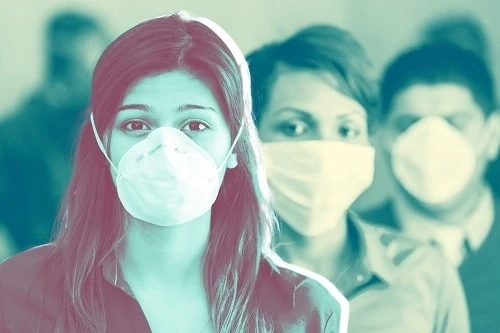Wearing any type of mask inside provides significantly improved protection against corona virus infection, with high-quality N95 and KN95 mask providing the best chance of preventing infection, the Centers for Disease Control and Prevention found in a survey.
Surgical masks, according to the CDC, reduce the likelihood of testing positive by 66 percent in indoor public settings. The health department reported that the top-of-the-line N95 and KN95 masks, the tight-fitting face coverings that are frequently worn by healthcare professionals, reduced the risk of infection by 83 percent.
Although wearing a cloth mask appeared to reduce the likelihood of testing positive by 56%, the results were not statistically significant.
"These data from real-world settings emphasise the critical relevance of using face masks or respirators consistently to lower the risk of infection with SARS-CoV-2 among the general public in indoor community settings," the CDC stated in its Morbidity and Mortality Weekly Report.
Answers to your N95 mask-related questions
N95 mask use has been a source of contention since the early stages of the corona virus pandemic when health officials advised the public not to purchase masks, which they believed should be reserved for medical professionals. The administration quickly revised its position on airborne virus masking and recommended everyone to wear face covers.
To this day, debates over whether to compel mask wear, who has the authority to impose it and under what conditions have persisted.
"There are still some who believe masks are ineffective," said Linsey C. Marr, a Virginia Tech expert in airborne virus transmission who was not involved in the new research. She stated that the CDC analysis reaffirms the well-established benefit of mask use by giving more real-world data.
Similarly, Jose-Luis Jimenez, a chemistry professor at the University of Colorado who was not involved in the study, said in an email that the study "adds more evidence to what we already know: this is mostly an airborne virus, and as a result, we are seeing an indoor pandemic." When masks are used indoors, transmission is reduced, with the protective impact rising with higher mask quality and fit."
The California Department of Public Health conducted the research between Feb. 18 and Dec. 1, 2021 — before the outbreak of omicron variants in the United States. The researchers examined 652 individuals who had recently tested positive for the virus and compared them to 1,176 individuals who tested negative. Each participant was asked if they had been in stores, churches, schools, restaurants, or other indoor public places in the 14 days preceding their test if they had worn a mask, and how frequently. They were also matched on a variety of other criteria, including vaccination status.
534 respondents were asked what type of mask they wore throughout the final three months of the poll.
The researchers acknowledged that depending on participants\' recall of their behavior in several public indoor settings may have hampered the trustworthiness of their findings, albeit they took attempts to mitigate this effect. Additionally, they did not account for any other preventive measures taken by participants, such as physical distance.
Nonetheless, the benefits of wearing a mask were discovered to be great. They backed up a laboratory and other real-world research indicating corona virus masks are an effective barrier.
What this demonstrates is that if you pay attention and consistently wear a decent mask, you have a considerably decreased likelihood of testing positive for covid-19.



